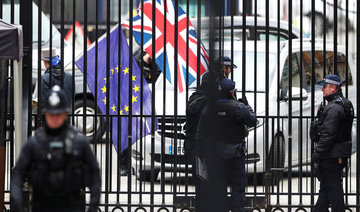BRUSSELS: EU negotiator Michel Barnier warned Friday that plans for a post-Brexit transition period to ease the pain of the split were at risk because of “substantial” disagreements with Britain.
Barnier also rejected claims by his British counterpart David Davis that Brussels had been “discourteous” by including a punishment clause in a draft transition deal in case Britain breached the bloc’s rules.
“If these disagreements persist, the transition is not a given,” Barnier told a news conference in Brussels after a round of Brexit talks with British negotiators. “To be frank I am surprised by these disagreements.”
Britain hopes to agree by an EU summit next month on a transition period of around two years after it leaves the European Union in 2019.
During this period, Britain will still follow EU laws in exchange for access to the single market, but lose all decision-making power.
Barnier said deep divisions remained on citizens’ rights for EU migrants moving to Britain during the transition, as well as the UK’s ability to object to new EU laws passed during the phase.
There was also a row over whether Britain could have a say in new justice and home affairs policies during the transition, which the EU says should last from Brexit Day on March 29, 2019 to December 31, 2020.
The Brexit transition is aimed at giving citizens, businesses and public services time to get used to the impact of Britain leaving, and to allow more space for talks on an eventual EU-UK trade deal.
Barnier added that he “wasn’t talking about a threat” but “if this disagreement were to persist there would undoubtedly be a problem, I hope we would be able to resolve those disagreements in the next round” of talks.
The former French minister also hit back at comments made by his UK counterpart David Davis, who was not in Brussels, that the EU was acting in bad faith and had been “discourteous.”
“There has not been the slightest trace of a lack of courtesy or of aggressivity,” Barnier said.
Barnier said that he did not understand the angry British reaction to a draft EU transition agreement that contained swift sanctions for Britain if it breached the terms of the deal, including freezing its single market access.
“There is no desire to punish,” Barnier said, adding that it was standard for international agreements to have a “serious and effective” enforcement mechanism.
A draft EU agreement published on Wednesday calls for the ability to sanction Britain in cases in which it would take too long to refer any breach of those rules to the EU’s top court.
That could include reimposing tariffs or customs checks, both of which Britain is supposed to be free of as a member of the EU internal market.
This week’s talks also covered the thorny issue of Northern Ireland.
Britain and the EU reached an interim deal in December on three key separation issues — the financial settlement, the Irish border and the rights of EU citizens after Brexit.
But translating that into a proper legal agreement is proving especially difficult on the Northern Irish issue.
Barnier said it was “important to tell the truth” that border checks between Northern Ireland and Ireland would be “unavoidable” if it left the single market and the customs union.
He added that the eventual deal would contain an emergency option which states that if Britain fails to find a special solution for Northern Ireland, the UK would remain in “full alignment” with the EU on trade issues to ease the border impact.
Northern Irish unionists and pro-Brexit lawmakers have already angrily rejected this.
Britain and the EU aim to start talks on a future relationship in April but time is running out. Barnier says a draft deal is needed by November so it can be ratified in time for Brexit.
Brexit transition ‘not a given’, EU’s Barnier warns
Brexit transition ‘not a given’, EU’s Barnier warns













